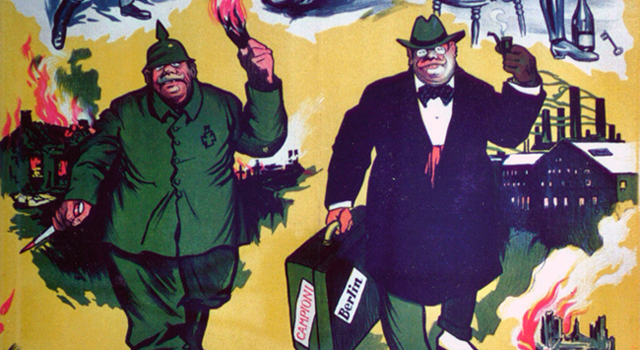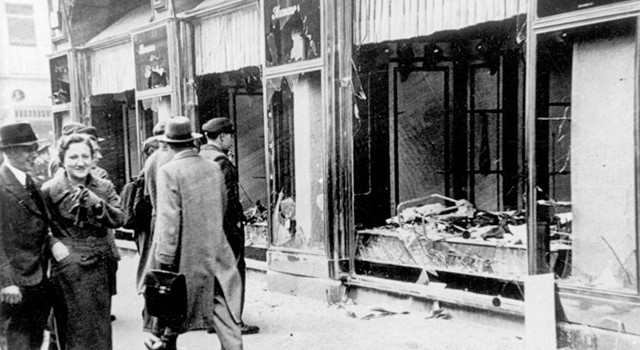Articles
No Comments
By Voices
On 22, Sep 2014 | No Comments | In Cities | By Voices
Rounding on the Germans
Chris Upton, Newman University, Birmingham
Kristallnacht – the Night of Broken Glass – was that fateful 24 hours in November 1938 when the German people (some of them, at least) turned on their Jewish neighbours. Families who had lived peaceably next door to each other for years became divided forever.
Such can be the effects of war and politics, and their handmaidens propaganda and hatred.
![Kristallnacht, Magdeburg, Nov. 1938 [Bundesarchiv, Bild 146-1970-083-42 / CC-BY-SA]](http://www.voicesofwarandpeace.org/wp-content/uploads/2014/09/bundesarchiv_kristallnacht.jpg) What happened in Birmingham in May 1915 cannot be compared to Kristallnacht; certainly no one died as a result of it. All the same, there are some strange and unsettling similarities.
What happened in Birmingham in May 1915 cannot be compared to Kristallnacht; certainly no one died as a result of it. All the same, there are some strange and unsettling similarities.
By the spring of 1915 the war that was meant to be over by Christmas was showing no signs of going away. Indeed, it seemed to be getting closer and crueller. First there were the Zeppelin raids, followed by the landings at Gallipoli and the Second Battle of Ypres. Then, in early May, the Lusitania was sunk by a German U-boat.
Feelings back home were beginning to run high. By this date (as a page in the Birmingham Post spelt out) the city had already lost 875 of its men to the war, and the number was always rising. And this was the moment when some in Birmingham (and in other British cities) began to look for scapegoats.
There were anti-German marches and protests as far afield as County Durham, South Wales and London.
Birmingham, of course, had always been a multi-cultural kind of place, and its shops and factories had more than their fair share of European migrants in them. Some of them had German-sounding names, albeit the bearers were Swiss, Scandinavian or Dutch.
![The German changes clothes but he is always the same German! 1918 [Istituto Centrale per il Catalogo Unico]](http://www.voicesofwarandpeace.org/wp-content/uploads/2014/09/bl-same-german.jpg) But (mercifully) this was Birmingham and not Berlin, so indignation was always likely to take a comic, rather than a tragic, turn. In High Street a can of sardines was hurled against a German café window. And over in Spring Hill a Belgian refugee drank too much and incited a crowd against the premises of a German butcher.
But (mercifully) this was Birmingham and not Berlin, so indignation was always likely to take a comic, rather than a tragic, turn. In High Street a can of sardines was hurled against a German café window. And over in Spring Hill a Belgian refugee drank too much and incited a crowd against the premises of a German butcher.
Victor Baronheid had some justification for ill-feeling. After all, his country had been overrun by the Kaiser, and he had been forced to flee to England. But his defence in court – that he had not expected English beer to be quite so strong – showed that even he recognised that his righteous anger had gone too far.
But judging someone by their surname was never likely to be a very precise kind of targeting, not in Birmingham, anyway.
The café in High Street, for example – known as John’s Restaurant – was owned by John Sackfeldt and his English wife. Technically, John was only German by dint of the fact that his native town in Denmark was now occupied by Germany. And anyway, John Sackfeldt had spent the last seven years in Birmingham, and the previous eleven in America.
Nevertheless, the mayhem perpetrated in their shop by 20 or more men and women showed that locals could be pretty indiscriminate in their discrimination. And that can of sardines, not to mention a plate of fish and chips, could easily have hurt someone.
What happened at Spring Hill and in the High Street on the night of May 14 were not isolated incidents. Across the city crowds gathered, and were incited to attack premises linked to Germans. On the same night Alice Tatlow took out her frustration on the shop of Joseph Bleser, a butcher in Holloway Head.
When Alice appeared in court, she pointed an accusing finger at Bleser and shouted: “When the Lusitania went down, he wanted to hoist a flag !” The allegation was flatly dismissed. Indeed, as was pointed out in court, Joseph Bleser had given a cart-load of bread to Birmingham’s Belgian refugees.
If Mrs Tatlow (who had a string of other convictions to her name) wished to round on Germans, she was certainly spoilt for choice in Holloway Head. A glance at the trade directories for the period shows that almost half the businesses in that street were owned by people with German-sounding names. But they were – to a man and woman – Jewish, themselves refugees from earlier pogroms across Central and Eastern Europe.
They included Solomon Levy, a film distributor (one of four Levys in the road), and a host of tailors and drapers by the name of Goldstein, Schneider and Jacobson. In her eagerness to single out Germans, Mrs Tatlow had turned anti-semitic by mistake.
But the trouble that was brewing convinced the authorities that it was time to act. In the blink of an eye 52 men of German extraction, albeit some of them with wives from Birmingham, were rounded up. Thus the cells at Steelhouse Lane were filled, not with the trouble-makers, but with their potential victims. The men were being detained, it was said, “for their own safety”.
And so, on August 26, the 52 individuals were marched across town and onto a train at New Street Station, their destination an internment camp in Cheshire. They called it, at the time, a concentration camp, but that phrase too, like the attacks on Jewish businesses, has become clouded by the memories of another war, just 30 years down the line.
As for the Sackfeldts and Joseph Bleser, the 1919 Birmingham trade directory shows that they had left, probably of their own accord. But where they went, I cannot say.





Submit a Comment